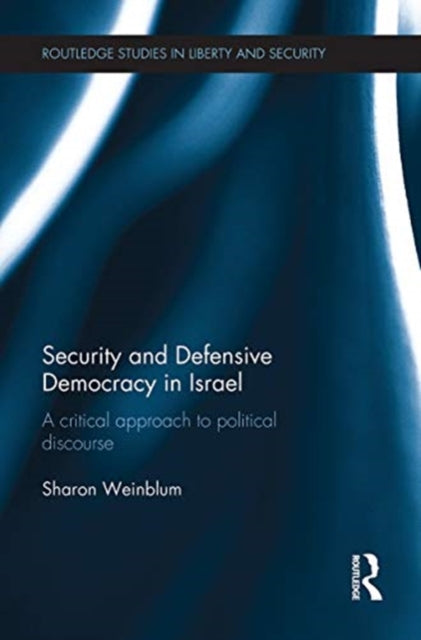SharonWeinblum
Security and Defensive Democracy in Israel: A Critical Approach to Political Discourse
Security and Defensive Democracy in Israel: A Critical Approach to Political Discourse
YOU SAVE £2.02
- Condition: Brand new
- UK Delivery times: Usually arrives within 2 - 3 working days
- UK Shipping: Fee starts at £2.39. Subject to product weight & dimension
Bulk ordering. Want 15 or more copies? Get a personalised quote and bigger discounts. Learn more about bulk orders.
Couldn't load pickup availability
- More about Security and Defensive Democracy in Israel: A Critical Approach to Political Discourse
This book examines how political actors in the Israeli parliament (the Knesset) have articulated the security-democracy nexus in their discourses. It demonstrates that two main narratives have competed: a marginal narrative anchored in basic rights, and a defensive democracy narrative that has become dominant. This narrative has legitimized the restriction of freedom of expression, freedom to participate in elections, freedom of movement, or the right to citizenship, reshaping the polity and identity of Israel's democratic regime.
Format: Paperback / softback
Length: 192 pages
Publication date: 31 March 2021
Publisher: Taylor & Francis Ltd
Security crises present political leaders with a challenging conundrum: ensuring the safety of citizens while simultaneously upholding democratic principles, fundamental rights, and liberties. Israel serves as a prime example in this regard, as it claims to be a democratic state yet has been embroiled in quasi-constant conflict with its neighboring countries and has faced numerous terror attacks. Consequently, the state of emergency has been in place since the state's establishment in 1948, and security measures have often conflicted with democratic values.
The tension between security and democracy has been a central theme in political thought since the time of Rousseau and Locke, and it has remained a focal point of political discourse following the events of 9/11 and the 2005 terror attacks in London. Numerous studies have explored how political actors navigate this tension or strive to balance security and democracy. However, the specific manner in which political actors conceptualize and frame this tension has received limited attention, and even less has been said about the consequences of such conceptualizations on democratic regimes.
To address this gap in knowledge, the book employs discourse theory and an innovative narrative analysis to examine 40 debates held in the Knesset on security-oriented laws enacted in two distinct contexts: the period preceding the first Palestinian intifada (1987) and the period following the eruption of the second intifada (2000). More specifically, the book delves into three types of laws and discussions related to them.
The first type of law examined is the Emergency Law, which has been in force in Israel since 1948. This law allows the government to suspend certain constitutional rights and powers during times of emergency, such as when faced with a military threat. While the Emergency Law has been used extensively to combat terrorism and other security threats, it has also been criticized for undermining democratic values and civil liberties.
The second type of law discussed is the Counter-Terrorism Law, which was enacted in 2002 in response to the second intifada. This law grants the government broad powers to combat terrorism, including the detention of suspects without trial and the use of force against suspected terrorists. While the Counter-Terrorism Law has been necessary to protect Israeli citizens from terrorist attacks, it has also been criticized for violating human rights and for undermining the rule of law.
The third type of law examined is the Law of Return, which grants Jews the right to immigrate to Israel and obtain citizenship. While the Law of Return has been a cornerstone of Israeli identity and has played a significant role in the country's demographic makeup, it has also been controversial due to its potential impact on the country's democratic character. Some argue that the Law of Return could lead to the displacement of Palestinian citizens and undermine the country's commitment to equality and pluralism.
In conclusion, this book provides a comprehensive analysis of how political actors in the Israeli parliament have articulated the security-democracy nexus in their discourses. By examining the debates held in the Knesset on security-oriented laws enacted in two different contexts, the book sheds light on the complex and multifaceted relationship between security and democracy. The book's findings highlight the challenges faced by political leaders in balancing security and democratic values, and they offer valuable insights into the implications of such tensions for democratic regimes.
Weight: 308g
Dimension: 234 x 156 (mm)
ISBN-13: 9780367787387
This item can be found in:
UK and International shipping information
UK and International shipping information
UK Delivery and returns information:
- Delivery within 2 - 3 days when ordering in the UK.
- Shipping fee for UK customers from £2.39. Fully tracked shipping service available.
- Returns policy: Return within 30 days of receipt for full refund.
International deliveries:
Shulph Ink now ships to Australia, Belgium, Canada, France, Germany, Ireland, Italy, India, Luxembourg Saudi Arabia, Singapore, Spain, Netherlands, New Zealand, United Arab Emirates, United States of America.
- Delivery times: within 5 - 10 days for international orders.
- Shipping fee: charges vary for overseas orders. Only tracked services are available for most international orders. Some countries have untracked shipping options.
- Customs charges: If ordering to addresses outside the United Kingdom, you may or may not incur additional customs and duties fees during local delivery.


